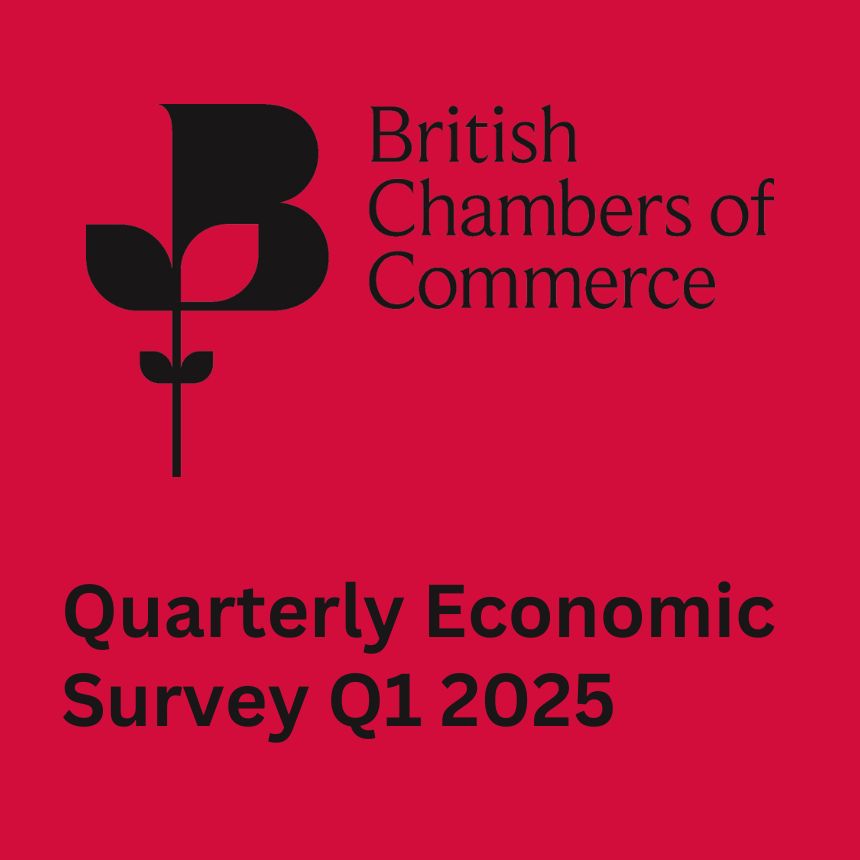Below is a press release on our latest Quarterly Economic Survey highlighting the impact of the national insurance rise coming into effect on Sunday. Comment from Chamber MD Suzanne Caldwell and responses from local businesses are included at the end.
- 59% of businesses say tax, including national insurance, is now a concern, the second highest level on record following a peak in the previous quarter
- Business confidence remains subdued, with less than half of businesses (48%) expecting turnover to increase in the next 12 months
- A quarter (26%) of businesses have cut back on investment in the past three months, while only 20% have increased investment
- Most businesses surveyed (55%) are expecting to put up their prices over the next three months, with labour costs continuing to be the main driver
Ahead of the rise in employer national insurance (NI) contributions coming into effect this Sunday, the British Chambers of Commerce Quarterly Economic Survey for Q1, shows business sentiment remains very weak as taxation continues to be the top concern.
59% of surveyed businesses cite it as a worry (compared with 63% in Q4 2024), the second highest level on record. At the same time, concern about inflation has risen to 53% (compared with 47% in Q4 2024), the highest level in a year.
Business confidence remains low, with less than half of (48%) businesses expecting their turnover to increase over the next twelve months (49% in Q4). In comparison, pre-Budget confidence was 58% in Q2 2024 and 56% in Q3 2024. Confidence levels are lowest in the retail industry (38%) and the transport and logistics sector (40%).
The survey was carried out before the recent Spending Review, with the fieldwork conducted between 10 February and 10 March. The data from over 5,000 businesses across the UK (91% of whom are SMEs) also shows that most businesses are expecting to raise prices.
Tax remains the top concern, with inflation worries on the rise
With the national insurance rise looming in days, concern about taxation remains the main concern for businesses – cited by 59% of responding businesses, down slightly from 63% in Q4 2024. This is the second highest level of tax concern since 2017, when the BCC started asking this question. The levels in certain sectors are higher, with 68% transport and logistics businesses, and 64% of production and manufacturing businesses raising tax as a concern.
Concern about inflation has increased since the previous quarter – 53% compared to 47% in Q4. Concern about inflation is most prevalent in the construction industry, with 57% of businesses identifying it as a concern. Worry about interest rates remains at 28%, the same level as Q4.
Business confidence remains subdued following Budget measures
Business confidence has fallen further since the immediate aftermath of the Budget. Only 48% of businesses say they expect their turnover to increase in the next twelve months, down from 49% in Q4. Once again, this is the lowest figure since the aftermath of the mini budget in late 2022. A fifth (21%) of businesses expect turnover to worsen (the same as Q4), and 31% expect no change.
Profitability confidence also continues to be hit. 39% of businesses expect profits to increase over the next year (40% in Q4), while 32% of businesses expect them to fall (same as Q4).
Most businesses are planning to raise prices
Over half (55%) of responding businesses say they expect to raise their prices in the next three months, the same elevated level as Q4. While 43% of businesses expect prices to stay the same, and only 3% expect them to decrease.
Labour continues to be far and away the main cost pressure for businesses, cited by 73% of businesses (75% in Q4). The issue is most significant for the production and manufacturing sector with 82% reporting it as a challenge, followed by 81% of businesses in the transport and logistics sector alongside hospitality businesses.
More businesses have cut back on investment plans
As businesses navigate rising cost pressures, 26% of responding businesses say they have cut back on investment plans in the past three months, up from 24% in Q4. 20% of business say they have increased investment plans, the same level as last quarter. 54% of businesses say their plans have remained the same.
The issue is more marked in certain sectors, with 40% of hospitality businesses and 35% of retailers reporting a scaling back of investment plans.
Business conditions struggle
The percentage of respondents reporting increased domestic sales remains broadly similar to the last quarter, 31% compared to 32% in Q4. 42% reported no change and over a quarter (27%) of businesses said they had seen a decrease in sales. Retailers were the most likely to have seen a fall in sales (37%) followed by manufacturers and hospitality businesses (35%).
A third of businesses (33%) report a fall in cash flow over the last three months, up from 30% in Q4. Only 21% of businesses have seen an increase, while for 46% cashflow has remained the same.
Suzanne Caldwell, Managing Director of Cumbria Chamber of Commerce said:
“The rise in employers national insurance has been a concern for months and from this weekend it becomes a reality for businesses across the UK and here in Cumbria.
The British Chambers of Commerce Quarterly Economic Survey (QES) for Q1 2025 shows that tax remains the top concern with businesses planning to cut investment and raise prices to offset the rise.
The Chamber is responsible for collecting the responses of Cumbrian businesses feeding into the QES. This Quarter we received a record number of responses from 211 Cumbrian businesses, which show that concerns around taxation are even more pronounced here in Cumbria against the national picture.
71% of Cumbrian businesses say tax is now a concern against 59% nationally, 38% expect their turnover to increase in the next 12 months against 48% nationally and 62% of businesses are expecting to put prices up in comparison to 55% on average across the UK. We believe these differences are mainly down to the proportion of visitor economy businesses represented in our survey, not surprising given the makeup of the county’s economy.
Much of this is down to the changes in Employers’ National Insurance and the minimum wage. Challenges for business will be further added to by the impact of US tariffs announced this week.
Growing our economy here in Cumbria depends on local businesses. We urgently need the government to publish a tax roadmap, which includes national insurance, to give businesses a direction of travel to lower cost pressures. Ministers must also focus on infrastructure projects and promoting exports, as a springboard for business growth.
The Employment Rights Bill also threatens to fuel further costs and complexity on businesses at a very delicate time. While Government has listened and made some sensible changes – the legislation as it stands risks unintended consequences which will limit economic growth.
The Government needs businesses to invest and grow to kickstart the economy. But unless swift action is taken to ease cost pressures, growth will remain elusive.”
Cumbrian businesses said:
“New HR rules will be a massive burden. Pay hikes and national insurance increases will force me to not re-employ leavers. I will have to increase prices to cover overheads. My suppliers are already informing us of price increases to cover the new overheads. I feel like this government is trying to destroy small businesses.” – Wholesale business
“The burden of regulation taxation as well as energy prices and wage costs are becoming an extremely worrying issue and stopping our growth and investment.” Hospitality business
“We are still planning for a massive hit on our modest profitability when the new financial year starts. The changes to NI contributions, the reduction in rate support, the hike in minimum wage is the biggest factor for caution in terms of investment or hiring new staff.” – Visitor attraction
“We have generally seen a positive trend towards future growth but the increase in NI taxes is something that is causing concern and a reeling back of expenditure.” – Consumer services business
“In 17 years we have never had such pressures from all directions. We will employ as few staff as possible going forward, using tech as much as possible. This government is disastrous!” – Visitor attraction
“Uncertainty and tax hikes have reduced incentives and ability to invest. Government clearly sees SMEs as a cash cow which it is slowly killing.” – Professional services business
“The NI increase has cost us c£500k that we had not budgeted.” – Manufacturing business
“The Budget has destroyed business confidence and led to cutbacks by clients. This is decimating British businesses and killing growth.” – PR business






